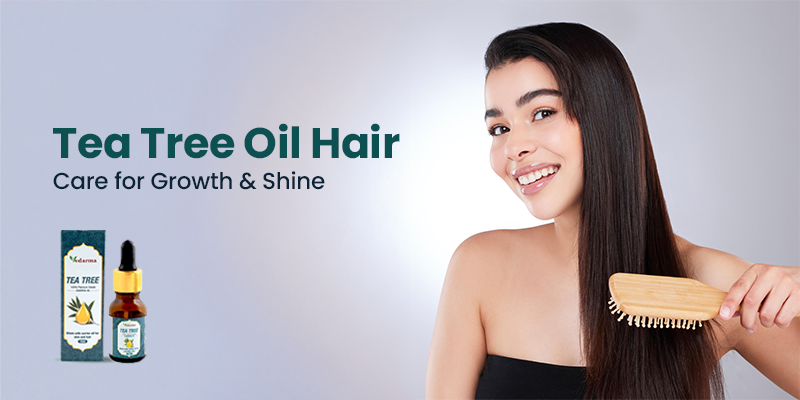BENEFITS OF NEEM OIL FOR HAIR PROBLEMS

Everyone desires healthy, beautiful hair, but harsh chemical products can often cause more harm than good. If you’re seeking a natural solution for your hair issues, neem might be the remedy. If you’re looking for a natural remedy for some of your hair problems neem just might be able to help you out.
Is Neem Oil Good for Hair?
Neem : An Ancient Remedy
The neem tree is revered in India and holds a significant place in Ayurveda, and known as ‘sarva roga nivarini,’ meaning ‘the tree that cures all ailments.’ Every part of the neem tree has a purpose: flowers for aromatherapy, twigs are used to brush teeth, and leaves for treating skin issues or for consumption. The seeds and flowers, however, are used to extract powerful neem oil. This oil’s antibacterial, antifungal, and antimicrobial properties make it a superb remedy for various skin and hair problems. Using neem oil for hair and skin care is centuries old in India, where women have relied on it to address numerous common issues effectively.
If you’re seeking a natural and safe solution to resolve your hair problems, we have the perfect remedy for you. In this article, we’ll explain the benefits of using neem oil for your hair and guide you on how to apply it for optimal results. Ready to discover the secret to your best hair yet? Scroll down to learn more about neem oil uses for hair!
Neem Oil Benefits for Hair Problems
Rich in antioxidants, neem oil can address all your hair problems. Substituting your regular oil with neem oil, or mixing them, can greatly benefit your hair and scalp. Let’s explore the various issues this powerful oil can solve.
1. Neem oil cures dandruff
Dandruff can result from poor hair care habits or reactions to unsuitable products. Regardless of the cause, dandruff is an embarrassing issue often caused by fungi like candida and Malassezia on the scalp. Neem oil for hair dandruff contains antifungal properties that effectively eliminate these dandruff-causing fungi. Additionally, neem oil can treat other dandruff-related issues, such as an itchy and irritated scalp.
Pro tip: For those with dandruff-prone scalps, regularly using neem oil can help prevent dandruff and maintain the scalp’s pH balance.
2. Neem oil treats lice
Lice infestations are common among young girls and sometimes adults, causing itchiness and embarrassment. Lice can multiply rapidly, so it’s crucial to address the issue promptly. Neem oil for hair lice contains an insecticidal agent that kills lice and their eggs, halting their reproduction. Additionally, the strong smell of neem oil repels lice, ultimately eliminating them from your hair and scalp.
Pro tip: Apply neem oil thoroughly to your scalp and leave it on overnight. In the morning, comb your hair to remove the dead lice.
3. Neem oil prevents hair thinning
Is hair thinning or balding keeping you up at night? Stress, poor diet, and overuse of styling products and tools can all contribute to hair thinning. Neem oil can help tackle this issue. Rich in fatty acids, neem oil benefits the scalp in many ways. Regular application strengthens hair follicles and encourages hair growth. Additionally, neem oil controls excess sebum production, which can cause hair thinning and impede hair growth.
Pro tip: For best results, massage neem oil into your scalp at night and wash it off in the morning.
4. Neem oil prevents premature greying
Premature hair greying can be distressing, as no one wants to appear older than they are. While chemical dyes provide a temporary fix, neem oil offers a safe, natural alternative to prevent further greying. However, it’s important to note that neem oil will not reverse existing grey hair; it will only prevent new hair from turning grey.
Pro tip: Warm neem oil slightly in the microwave before applying it to your scalp to ensure better absorption into the hair follicles.
5. Neem oil promotes hair growth
Did you know neem oil can also enhance hair growth? Neem oil for hair growth provides regenerative properties that stimulate hair follicles, promoting growth. Neem oil also boosts blood circulation in the scalp, preventing excessive hair fall and thinning caused by pollution, stress, and medication. Additionally, its anti-inflammatory and antibiotic properties treat scalp infections, allowing hair to grow naturally.
Pro tip: If you are curious to know how to use neem oil for hair growth, we have the answer. Apply gentle pressure with your fingertips while massaging neem oil into your scalp to stimulate the follicles, improve blood circulation, and relax your mind.
6. Neem oil conditions dry hair
A simple and natural way to revive dry, damaged, and lackluster hair is through a traditional oil massage, known as “champi.” Regardless of the oil you choose, it will leave your hair soft and nourished. However, opting for neem oil not only conditions and repairs damaged hair but also provides additional benefits mentioned earlier. If you seek an oil that offers more than just conditioning, neem oil is the ideal choice.
Pro tip: For thorough conditioning of every hair strand, wrap your oiled hair in a towel soaked in hot water or expose it to steam after application.
7. Neem oil treats scalp infections
The potent healing properties of neem oil make it a superb remedy for scalp infections. In winter, when the sudden temperature drop can lead to dryness and increased susceptibility to infections, neem oil’s anti-inflammatory, antiseptic, antibacterial, antifungal, and antiviral properties prove invaluable. It helps normalize the pH balance of the scalp, regulating sebum production.
Pro tip: Apply neem oil weekly to prevent scalp infections and promote relaxation.
How to Apply Neem Oil to Hair?
Using neem oil alone can be potent, so it’s recommended to use or dilute it with a carrier oil like jojoba, coconut, or olive oil. A general guideline is to mix 12 drops of neem oil with one ounce of carrier oil.
Leave the oil in your hair for approximately an hour or overnight, depending on the severity of the hair issue, before rinsing it out.
Alternatively, you can add a few drops of neem oil to your regular shampoo, massage it into the scalp thoroughly, and then rinse it out.
Revitalize Your Hair Naturally with Vedarma’s Hair Ropan: The Ultimate Herbal Hair Oil
Introducing Vedarma’s Hair Ropan, an Ayurvedic hair oil formulated to redefine the health of your hair. This herbal hair oil is designed to prevent dandruff, stop hair fall, and promote hair growth. Enriched with a blend of potent ingredients such as Rosemary Oil, Neem Oil, Castor Oil, and more, it effectively locks in moisture, increases shine, and untangles tangled hair ends. Suitable for all scalp types, this ayurvedic product offers a holistic solution to common hair concerns.
To use, simply dip your fingertips into a teaspoon of oil and gently massage the entire scalp, starting from the neck and working upwards until you reach your temples. For optimal results, massage daily for a minimum of 2-3 weeks, and for enhanced benefits, wrap your hair in a moist hot towel for 15-20 minutes post-massage. Experience the rejuvenating effects of Vedarma’s Hair Ropan and unlock the secrets to healthier, more vibrant hair.
FAQs On Neem Oil For Hair
Is it permissible to apply neem oil on the skin?
Indeed, neem oil can be applied to the skin to alleviate concerns such as acne, blackheads, hyperpigmentation, and other conditions. However, it is advised not to apply it directly onto the skin; instead, blend it with a carrier oil and always conduct a patch test beforehand.
What is the recommended frequency for applying neem oil to the hair and scalp?
For optimal outcomes, regular application is advised. Nevertheless, applying it daily and leaving it overnight might lead to irritation. Hence, commence with once a week application, and if your scalp responds positively, consider increasing it to twice a week.
Can neem oil be used safely throughout all seasons?
Absolutely, neem oil is suitable for year-round use. Nonetheless, for optimal outcomes, consider varying the carrier oil according to the season. During winter, coconut oil works well, while olive oil is preferable for summer application.




